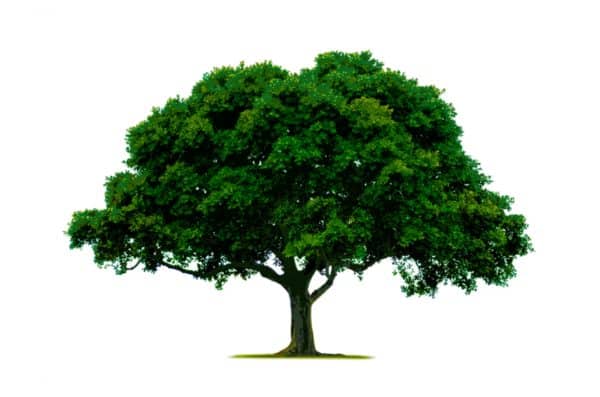

For businesses looking to grow their brand, tree planting seems like the environmental equivalent of a no-brainer. Having a tag line like, “For every coffee/T-shirt/bottle of wine you buy, we’ll plant a tree,” not only lets companies that plant tree for every purchase come across as a bastion of sustainability, but it gives people the chance to feel ethically righteous even as they keep buying things.
But how great is tree planting, anyway?
As the go-to standard for offsetting carbon emissions, experts say the practice falls far short, which could spell trouble not just for product merchants but also for proponents of cap and trade emissions schemes, which, like Ontario’s new system, need tree planting to be part of the the carbon trading equation.
Is TenTree legit?
The trend has been around for a while, whether it’s coffee company Starbucks’ “One Tree for Every Bag” idea, which promises a new rust-resistant coffee tree in one of its growing regions for every bag of coffee purchased (the company has committed to planting 100 million trees by the year 2025) or Canada’s own Tentree clothing company, which ups the ante to, you guessed it, ten trees planted for every T-shirt, hoodie or ball cap you buy.
Does Tentree really plant trees?
Is TenTree legit? Well, the company has planted more than 30-million trees.
But for almost as long, tree planting as a way to stay green and, particularly, as a form of carbon offsetting —that practice of subtracting from your own carbon footprint by paying for someone else’s emission-reducing projects— has had its detractors.
The David Suzuki Foundation publishes its own guide for measuring, reducing and offsetting your carbon emissions, yet it explicitly dismisses tree planting, saying that due to the “many problems with tree planting projects,” other offsetting measures such as energy efficiency and renewable energy projects should be the focus.

What’s the problem with planting trees? Although forests are known to be carbon sinks, effectively pulling CO2 out of the air and sequestering it naturally, tree planting is said to be only a temporary solution, as even a forest has a lifespan after which that sequestered carbon can get re-released into the atmosphere.
“It is not a slam dunk in terms of providing the kind of carbon benefit we would like to have,” says Chris Field, ecologist with the Carnegie Institution’s Department of Global Ecology in California, to the Guardian. “In the long run, solving the carbon problem is going to be more about reducing emissions rather than storage.”
Companies that plant trees may be missing the big picture…
As well, tucking a seedling into the ground may be a nice promise for the future but that little tree won’t be making a dent in the carbon count for years to come. Thus, companies or individuals who offset via tree planting aren’t really addressing global warming as it exists today, a big problem considering the urgency of the situation.
That’s why most carbon offset schemes now focus on supporting clean energy initiatives such as methane gas capture projects for landfills or energy efficient water treatment facilities in developing countries.
In fact, the whole idea of carbon offsetting has lost some of its lustre. Take the travel industry, an early advocate, where customers seemed to like the idea of offsetting all that jet fuel they burned up by flying around the world. In the early 2000s, Responsible Travel in the United Kingdom was one of the first travel companies to give customers the option of paying a little more for their vacation to offset those emissions. But by 2009, the company gave up on the idea, saying they would concentrate on providing low-emission (train travel, bike excursion, close-to-home) trips for its customers, instead.
“We believe that the travel industry’s priority must be to reduce carbon emissions, rather than to offset,” says Justin Francis, founder of Responsible Travel. “Too often offsets are being used by the tourism industry in developed countries to justify growth plans on the basis that money will be donated to projects in developing countries. Global reduction targets will not be met this way.”

It’s partly been an image problem, as well, says Rachel Dodds, director of the Hospitality and Tourism Research Institute at Ryerson University in Toronto.
“Offsetting has lost traction in recent years but that’s probably related to the general lack of focus on climate change by the media,” Dodds said in conversation with Cantech Letter. “Sustainability is still not a common practice across the tourism and hospitality industries, but additionally for offsetting, there are so many different tools without clear outlines of where the money goes or what it’s used for that the consumer is often just left confused.”
Yet, somehow, the idea of tree planting our way around global warming is still being touted. And not merely by shirt and coffee companies: Ontario’s new cap and trade system, like similar schemes already in place in Quebec and California, involves tree planting as a carbon offsetting measure. The system works by putting a cap on the overall emissions that industry and other big polluters are allowed to generate, and any company that exceeds their emissions targets is then required to buy allowances (carbon credits) at auction or obtain them from other companies with lower emissions. Notably, those credits can be purchased in the form of offsets from tree planting.
Ontario’s Ministry of the Environment and Climate Change, for instance, lists tree planting along with manure management (for methane gas) and upgrading commercial coolant systems as options for offsetting. “Offset credits would create financial incentives for companies, people and organizations to implement projects to fight climate change,” reads a statement from the Ministry. “At the same time, offset credits would give companies or facilities covered by the cap and trade program lower-cost options and flexibility in how they meet their compliance obligation.”
How is it that tree planting has remained in the game?
The optics are simple, for one. Anyone can plunk the details from their latest trip to Europe into a carbon footprint calculator and get a readout on exactly how many trees it would take to cover the damage. That’s harder to do (and less appealing) for your portion of a manure treatment plant.
But the attraction goes deeper. Frederik Vroom is the Grow Clean Air program manager for Tree Canada, an organization that works with private companies and municipalities to plant trees mostly in urban areas across the country, but which also operates a small-scale offsetting program. Vroom says that while tree planting may have its detractors, the benefits go beyond the one seedling in the ground in that it helps to connect people with the bigger picture.
“We helped a musician recently who wanted to offset the emissions from her tour,” says Vroom in conversation with Cantech Letter. “People want to take action in their own communities, and tree planting is an activity with a tangible, long-lasting result.”
So while the major gains provided by emissions offsets will keep coming from things like windmills and water treatment plants, it looks like the personal, more natural touch from tree planting will continue to be a draw.
“Climate change is caused by human interference in the global carbon cycle,” explains Vroom. “As a solution to the problem, we need to do more, but as an educative mechanism, tree planting gives an opportunity to explain this cycle and to stress the importance of holism, of proper land and resource management. That’s the value of trees,” he says.
Comment
One thought on “Are companies like Tentree legit?”
Leave a Reply
You must be logged in to post a comment.



 Share
Share Tweet
Tweet Share
Share




Just a note about 10tree… as well as free planting, they use sustainable or recycled fabrics, which is a big deal as the garment industry is one of the key polluters, and microfibre is an ongoing nightmare. No vested interest here-
I just think 10 Tree is one of the good guys. Thanks